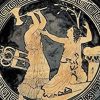Analysis The weakness of the moral position represented by the Furies is shown by the prediction in the last lines of this ode that Orestes will be killed by a member of his own family. The only solution the Furies can visualize is one in which the law of blood […]
Read more Summary and Analysis The Eumenides: First Stasimon (Lines 143-178)Summary and Analysis The Eumenides: First Episode (Lines 64-142)
Apollo promises that he will never forsake Orestes. He says that the Furies are creatures from the deepest bowels of the earth, hated as much by the gods as they are by humans. They will pursue Orestes wherever he goes, but he must endure their torments. Eventually he will arrive […]
Read more Summary and Analysis The Eumenides: First Episode (Lines 64-142)Summary and Analysis The Eumenides: Prologue (Lines 1-63)
The priestess goes into the temple. There is a short pause, then she rushes out in terror. She describes the horrible sight she has just seen — a man covered with bloodstains and holding a bloody sword is kneeling at the altar stone in the posture of a suppliant; asleep […]
Read more Summary and Analysis The Eumenides: Prologue (Lines 1-63)Summary and Analysis The Choephori, or The Libation Bearers: Exodos (Lines 971-1074)
As he speaks, Orestes becomes restless and agitated. He begins to feel as if he is losing his mind and insists desperately that the killing of his mother was right and that he acted according to the command of Apollo. But now, he says, he must forfeit the inheritance he […]
Read more Summary and Analysis The Choephori, or The Libation Bearers: Exodos (Lines 971-1074)Summary and Analysis The Choephori, or The Libation Bearers: Fourth Episode (Lines 837-933)
As the servant goes out, Orestes and Pylades enter with drawn swords. At last the mother and son confront each other. You are next, Orestes says. Clytaemestra orders Orestes to stand back, then appeals to him to remember that she is the mother who gave him life and raised him […]
Read more Summary and Analysis The Choephori, or The Libation Bearers: Fourth Episode (Lines 837-933)Summary and Analysis The Choephori, or The Libation Bearers: Third Episode (Lines 649-778)
The servant calls Clytaemestra. She comes to the door and welcomes the strangers. After offering them the hospitality of the palace, she asks to hear their message. Orestes says that he and his companion are Daulian merchants, just arrived in Argos from Phocis. On the road to Argos, they encountered […]
Read more Summary and Analysis The Choephori, or The Libation Bearers: Third Episode (Lines 649-778)Summary and Analysis The Choephori, or The Libation Bearers: Second Stasimon (Lines 583-648)
There are many terrifying examples of the lengths to which women have gone when possessed by passion. Althea knew that her son Meleager could live only as long as a certain piece of wood was undamaged, but in a rage she burned the wood and killed him. Scylla caused the […]
Read more Summary and Analysis The Choephori, or The Libation Bearers: Second Stasimon (Lines 583-648)Summary and Analysis The Choephori, or The Libation Bearers: Second Episode (Lines 477-582)
He agrees but first wants to know why Clytaemestra sent libations to the grave of the man whom she murdered, especially since she can never atone for his death. The chorus answer that it was because of a dream that terrified her the night before. In it, Clytaemestra gave birth […]
Read more Summary and Analysis The Choephori, or The Libation Bearers: Second Episode (Lines 477-582)Summary and Analysis The Choephori, or The Libation Bearers: First Stasimon (Lines 305-476)
Analysis The meaning of this long, three-sided, lyrical passage has been debated by critics. It seems to serve several functions, all aimed at creating an atmosphere in which the murder of Clytaemestra is dramatically and psychologically convincing. To some extent, the scene is a mystical invocation of the spirit of […]
Read more Summary and Analysis The Choephori, or The Libation Bearers: First Stasimon (Lines 305-476)Summary and Analysis The Choephori, or The Libation Bearers: First Episode (Lines 83-304)
The women, who are still devoted to their dead master, advise her to pray for revenge against Aegisthus and Clytaemestra and to ask her father’s blessings for herself, Orestes, and all others who hate his murderers. Electra prays to Hermes to carry her message to Agamemnon, then calls upon her […]
Read more Summary and Analysis The Choephori, or The Libation Bearers: First Episode (Lines 83-304)
